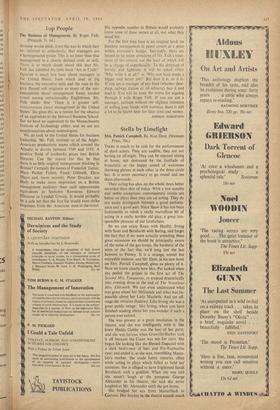Top People
ANYONE would think, from the way in which they are referred to collectively, that managers are a homogeneous group. This is no truer than that management is a clearly defined craft or skill. 1 here is so much doubt about this that Mr. Falk has subtitled his little book 'Art or Craft?' Opinion is much less hazy about managers in the United States, from which land of big business. the executive suite and the man in the grey flannel suit originate so many of the mis- conceptions about management freely handed round among unbusinesslike Englishmen. Mr. Falk thinks that 'There is a greater self- consciousness about management in the United States.' He gives this as a reason for the absence of an equivalent to the Harvard Business School. But we have no equivalent to the Massachusetts Institute of Technology either, and we are not unselfconscious about technologists.
We do look to the United States for business leadership. Mr. Falk reminds us of the Anglo- American productivity teams which crossed the Atlantic in droves between 1949 and 1953. A positive flood of textbooks pours into British libraries. Can the reason for this be that there is so little original management thinking in Britain? Certainly the names of Frederick Taylor, Mary Parker Follett. Frank Gilbreth, Elton Mayo and, more recently, Peter Drucker, are likely to make more impression on a British management audience than such approximate equivalents as Seebohm Rowntree, Edward Elbourne or Lynda!! Urwick. It would probably be a safe bet that the first list would even strike responses from the American man-in-the-street. His opposite number in Britain would probably know none of these names at all, nor what they stood for.
For the first time here is an original book on business management in paper covers at a price within everyone's budget. Inevitably, there are bound to be many criticisms of Mr. Falk's treat- ment of the subject, not the least of which will be a charge of superficiality. To the defences of brevity and lightness, it will be asked either 'Why write it at all?' or 'Why not have made a bigger and better job?' But here it is, as it is. If you arc a manager of any kind (whether shoe- shop, railway station or oil refinery), buy it and read it. You will be none the worse for arguing through it with Roger Falk. If you are not a manager, perhaps without the slightest intention of soiling your hands with business, there is still a lot to be learnt here for little time and money.
ANDREW ROBERTSON














































 Previous page
Previous page